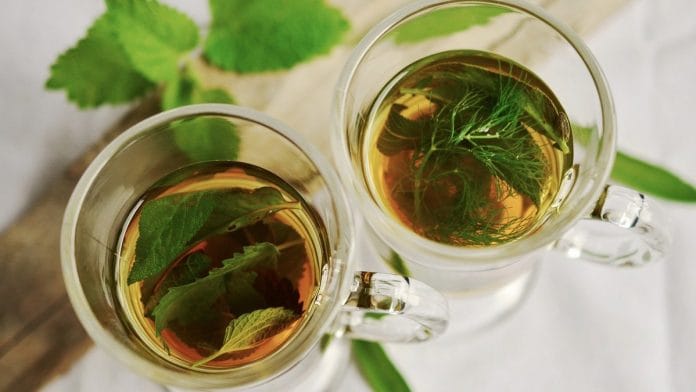New Delhi: Herbal teas made from sage and perilla — herbs from the mint family — have shown to hinder the replication of SARS-CoV-2 in a laboratory study published by German researchers on MedRxiv, a portal for preprints or preliminary reports that have not been peer-reviewed.
MedRxiv was founded by Cold Spring Harbor Laboratory (CSHL), a not-for-profit research institution, along with Yale University, and the peer-reviewed British Medical Journal (BMJ).
“The current SARS-CoV-2 or COVID-19 pandemic represents an unprecedented medical and socioeconomic crisis. Highly efficient treatment options preventing morbidity and mortality are not broadly available and approved drugs are hardly affordable in developing countries,” said the study titled ‘Universally available herbal teas based on sage and perilla elicit potent antiviral activity against SARS-CoV-2 in vitro’.
It was uploaded on MedRxiv Wednesday.
To identify cost-effective and ubiquitously available options, the researchers from the University of Duisburg-Essen, Germany, tested common herbs that are consumed worldwide as herbal teas.
According to the study, “Aqueous infusions prepared by boiling leaves of the Lamiaceae plants, perilla and sage, elicit potent antiviral activity against SARS-CoV-2 in human cells.”
Both sage and perilla belong to the family of Lamiaceae which includes other important aromatic spices such as basil, mint, rosemary, marjoram, oregano, thyme, and lavender.
“Sustained antiviral activity was evident even when cells were treated for only half an hour, and in therapeutic as well as prophylactic regimens. Given the urgency, such inexpensive and broadly available substances might provide help during the pandemic —especially in low-income regions,” the study pointed out.
Also read: 6 in 10 diabetics in India worry about catching Covid, getting hospitalised, study finds
‘Use of non-pharmaceutical interventions important’
The study, which was conducted by seven researchers, also noted that even after vaccine approvals it will take “several months until the vaccinated and convalescent individuals establish herd immunity”. Non-pharmaceutical interventions and antiviral treatments are, therefore, important to curb death rate due to Covid-19, the authors noted.
They, however, also said consumption of herbal teas cannot and should not replace non-pharmaceutical interventions or clinically-approved drugs.
Given their inexpensive and universal availability, the herbal teas may prevent and/or relieve some of the suffering induced by the pandemic.
“In the era of modern medicine, some people have reservations concerning the use of traditional and herbal medicines. However, a highly relevant fraction of recently approved modern therapeutics directly or indirectly originate from natural products some of which are known to be applied by our ancestors,” the researchers said.
How the study was conducted
The researchers used an experimental setup for short-term incubation of infected cells with herbal teas.
“We infected highly SARS-CoV-2-permissive Vero E6 cells for one hour before the virus suspension was removed and different dilutions of aqueous infusions of perilla and sage were added,” the study said.
The researchers also included coriander as a control group, against which the performance of the sage and perilla could be measured. Coriander is a “herb that does not belong to the family of Lamiaceae and that is to our knowledge not commonly used as medicinal herb”.
“We applied aqueous infusions that were prepared by boiling up the coriander, perilla, and sage leaves and subsequent simmering at 60°C for 2 hours to ensure complete extraction of the water-soluble components of the herbs,” the study said.
“Intriguingly, the short-term treatment with perilla and sage infusions was sufficient to significantly inhibit the replication of SARS-CoV-2.”
To further substantiate the impact of herbal teas on SARS-CoV-2 replication, the researchers said they repeated the experiment with two different doses of the virus and stained infected cells for immunofluorescence microscopy — a common technique of using a fluorescence microscope to identify and differentiate between the antibodies and antigens.
“The number of infected cells clearly diminished after treatment with perilla and sage infusions,” the study noted.
‘Sage, perilla leaves in tea-bags retain antiviral activity’
The researchers also used dried herbal material against fresh ones. The study noted that herbal teas prepared from commercially available tea bags or dried herb leaves may also contain sufficient concentration of the antiviral compound(s).
To further adapt the experimental setup to realistic conditions of tea consumption, they shortened the treatment time from 1 hour to 30 minutes. “Even under this condition, significant reduction of viral replication was observed.”
“We compared the antiviral activity of infusions prepared from fresh or dried herb leaves. Dried sage leaves retained most of the antiviral component(s) whereas dried perilla was less effective as compared to fresh perilla leaves although significant inhibition of viral replication was observed…,” said the study.
Also read: India’s mRNA-based Covid vaccine won’t need ultra cold conditions for storage — Pune firm







I wonder if after sufficient peer-reviewed research, Aurvedic medicines can yield results as well.
Possible. Probable for some medicines, in my opinion. I commend your open mind on the question.
Aurveda can yield better results but people want quick solutions and we trust Germans more then us. Colonial era inferiority complex